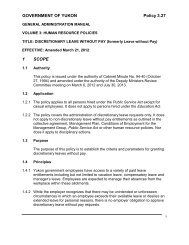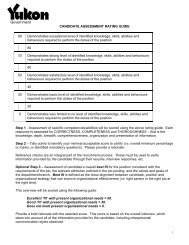Scent Sensitivity Brochure [582.03 KB ] - Public Service Commission
Scent Sensitivity Brochure [582.03 KB ] - Public Service Commission
Scent Sensitivity Brochure [582.03 KB ] - Public Service Commission
You also want an ePaper? Increase the reach of your titles
YUMPU automatically turns print PDFs into web optimized ePapers that Google loves.
For more information contact<br />
your Human Resources Branch<br />
or the Staff Relations Branch,<br />
<strong>Public</strong> <strong>Service</strong> <strong>Commission</strong>.<br />
To learn more:<br />
The following websites offer information<br />
about fragrance sensitivity:<br />
• The Canadian Lung Association: http://<br />
www.lung.ca/cando/scents.html<br />
• Canada Safety Council: see Perfume<br />
in the Workplace http://www.safetycouncil.org/info/OSH/perfume.html<br />
• Canadian Centre for Occupational<br />
Health and Safety (CCOHS): www.<br />
ccohs.ca/oshanswers/hsprograms/<br />
A little for you<br />
may be a lot for<br />
someone else!<br />
<strong>Public</strong> <strong>Service</strong> <strong>Commission</strong>
What is scent sensitivity?<br />
• Exposure to perfumes, colognes,<br />
and other scented products can<br />
trigger health problems for some<br />
individuals. Some people with asthma<br />
and other respiratory illnesses, chronic<br />
heart or lung diseases, migraines,<br />
allergies, environmental illness or<br />
multiple chemical sensitivity can<br />
experience mild to severe symptoms<br />
when exposed to scented products.<br />
Did You Know?<br />
• The chemicals used to make the scents<br />
in products such as perfume, cologne,<br />
hairspray, air fresheners, and cleaning<br />
products linger in the air even when we<br />
can no longer smell them.<br />
• Using scented products in the<br />
workplace increases the amount of<br />
chemicals in our workplace air and may<br />
contribute to the increasing sensitivity<br />
to these chemicals.<br />
• As we age, our olfactory (smelling)<br />
sense declines and we may be using<br />
more scent perceivable by others than<br />
we realize.<br />
• The application of a scented product<br />
in a small area such as a washroom<br />
can leave a heavy concentration of<br />
chemicals in the air for a long period.<br />
A highly sensitive individual can be<br />
severely affected hours after someone<br />
wearing minimal scent has left.<br />
• Sensitive individuals can experience<br />
a wide variety of symptoms from the<br />
chemicals used in these products,<br />
including:<br />
• eye, nose and throat irritation<br />
• headache or migraine<br />
• nausea or dizziness<br />
• inability to concentrate or anxiety<br />
• fatigue, weakness or joint pain<br />
• allergic reactions or asthma attacks<br />
What about Unscented<br />
Products?<br />
Products labeled “unscented” or<br />
“fragrance-free” which do not appear to<br />
contain scents cannot guarantee that no<br />
scent chemicals may actually have been<br />
added to the product.<br />
• According to Health Canada’s<br />
Cosmetic Program these terms mean<br />
that “there have been no fragrances<br />
added to the cosmetic product, or that<br />
a masking agent has been added in<br />
order to hide the scent.”<br />
• If the word fragrance or flavour is listed<br />
as ingredients, then there is likely to<br />
be fragrance in the product. If you are<br />
unsure about a product, it may help<br />
to contact the manufacturer for more<br />
information.<br />
• More and more products now have<br />
truly fragrance-free versions which you<br />
can find at your grocery or pharmacy.<br />
Actions we can all take:<br />
Employers, unions and employees have<br />
the responsibility to provide or contribute<br />
to a healthy and safe workplace for all<br />
employees and to support concerns of<br />
employees with health needs.<br />
We all share the air and each of us<br />
can help to create a healthier work<br />
environment for everyone by reducing<br />
the amount of chemicals in our indoor air.<br />
<strong>Scent</strong> sensitivity makes sense!<br />
• Please be courteous by keeping your<br />
fragrance within your own personal<br />
“scent circle,” less than an arm’s length<br />
away.<br />
• Do not apply scent in public areas such<br />
as washrooms.<br />
• If attending meetings or training why<br />
not be scent free?<br />
If you have a concern regarding scented<br />
products:<br />
• Speak to individuals who are using<br />
scent or have a scented product in their<br />
area.<br />
• Talk to your supervisor or manager and<br />
they will contact the Human Resources<br />
Branch if they have questions.


![Scent Sensitivity Brochure [582.03 KB ] - Public Service Commission](https://img.yumpu.com/11603490/1/500x640/scent-sensitivity-brochure-58203-kb-public-service-commission.jpg)
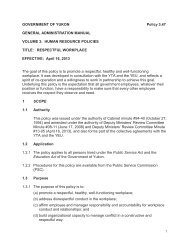
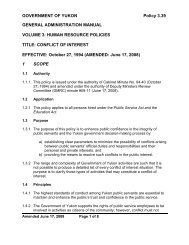

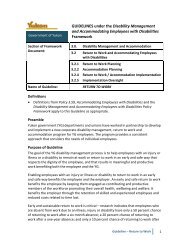


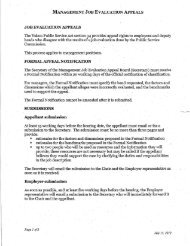
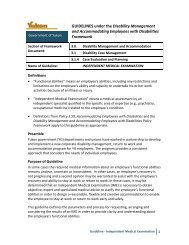

![Dental Claim Form [521.04 KB ]](https://img.yumpu.com/25553456/1/190x245/dental-claim-form-52104-kb-.jpg?quality=85)
